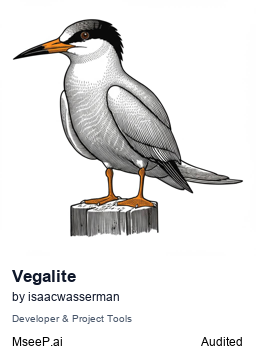Mcp Vegalite Server
by isaacwasserman
Provides an interface for LLMs to visualize data using Vega‑Lite syntax, supporting saving of data tables and rendering visualizations as either a full Vega‑Lite specification (text) or a base64‑encoded PNG image.
Mcp Vegalite Server Overview
What is Mcp Vegalite Server about?
Mcp Vegalite Server implements two core tools that let LLMs store tabular data on the server and generate visualizations with Vega‑Lite. It can return the complete specification for downstream processing or a rendered PNG image.
How to use Mcp Vegalite Server?
Add the server to your Claude Desktop configuration (or any MCP‑compatible client) with the following JSON snippet:
{
"mcpServers": {
"datavis": {
"command": "uv",
"args": [
"--directory",
"/absolute/path/to/mcp-datavis-server",
"run",
"mcp_server_datavis",
"--output_type",
"png" // or "text"
]
}
}
}
Then invoke the save_data and visualize_data tools from the LLM, supplying the required arguments.
Key Features
- save_data: Persist a table of aggregations on the server for later use.
- visualize_data: Render a stored table using a user‑provided Vega‑Lite JSON specification.
- Dual output modes:
textreturns the full spec with embedded data;pngreturns a base64 PNG via theImageContentcontainer. - Simple integration with Claude Desktop and other MCP‑compatible clients.
Use Cases
- LLM‑driven data exploration within a conversational interface.
- Automated report generation where visualizations are created on‑the‑fly.
- Embedding dynamic charts in chat applications without requiring the client to run Vega‑Lite locally.
FAQ
Q: How do I store data for later visualization?
A: Call the save_data tool with a unique name and an array of objects representing the table.
Q: Which output types are supported?
A: text returns the full Vega‑Lite spec; png returns a base64‑encoded PNG image.
Q: Do I need to know Vega‑Lite syntax?
A: Yes, you supply a JSON Vega‑Lite specification when calling visualize_data.
Q: Can I change the output format?
A: Set the --output_type argument to either text or png in the server configuration.
Q: Where does the PNG image go?
A: It is returned inside the MCP ImageContent container, ready for the client to display.
Mcp Vegalite Server's README
Data Visualization MCP Server
Overview
A Model Context Protocol (MCP) server implementation that provides the LLM an interface for visualizing data using Vega-Lite syntax.
Components
Tools
The server offers two core tools:
save_data- Save a table of data agregations to the server for later visualization
- Input:
name(string): Name of the data table to be saveddata(array): Array of objects representing the data table
- Returns: success message
visualize_data- Visualize a table of data using Vega-Lite syntax
- Input:
data_name(string): Name of the data table to be visualizedvegalite_specification(string): JSON string representing the Vega-Lite specification
- Returns: If the
--output_typeis set totext, returns a success message with an additionalartifactkey containing the complete Vega-Lite specification with data. If the--output_typeis set topng, returns a base64 encoded PNG image of the visualization using the MPCImageContentcontainer.
Usage with Claude Desktop
# Add the server to your claude_desktop_config.json
{
"mcpServers": {
"datavis": {
"command": "uv",
"args": [
"--directory",
"/absolute/path/to/mcp-datavis-server",
"run",
"mcp_server_datavis",
"--output_type",
"png" # or "text"
]
}
}
}
Mcp Vegalite Server Reviews
Login Required
Please log in to share your review and rating for this MCP.
Similar MCP Servers like Mcp Vegalite Server
Explore related MCPs that share similar capabilities and solve comparable challenges
MindsDB
Officialby mindsdb
Enables humans, AI agents, and applications to retrieve highly accurate answers across large‑scale data sources, unifying heterogeneous databases, warehouses, and SaaS platforms.
Vizro
by mckinsey
Build high-quality data visualization apps quickly using a low-code toolkit that leverages Plotly, Dash, and Pydantic.
MCP Server Chart
by antvis
Offers over 25 AntV chart types for automated chart generation and data analysis, callable via MCP tools, CLI, HTTP, SSE, or streamable transports.
Mcp Server Data Exploration
by reading-plus-ai
A versatile tool that enables interactive data exploration through prompts, CSV loading, and script execution.
Wren Engine
by Canner
Provides a semantic engine that lets MCP clients and AI agents query enterprise data with contextual understanding, precise calculations, and built‑in governance.
Google Analytics MCP Server
by surendranb
Provides natural‑language access to Google Analytics 4 data via MCP, exposing over 200 dimensions and metrics for Claude, Cursor and other compatible clients.
BigQuery MCP Server
by ergut
Provides secure, read‑only access to BigQuery datasets, allowing large language models to query and analyze data through a standardized interface.
Google Ads MCP Server
by gomarble-ai
Provides seamless integration of the Google Ads API with Model Context Protocol clients, handling OAuth 2.0 authentication, automatic token refresh, GAQL query execution, account management, and keyword‑research capabilities.
Vantage MCP Server
by vantage-sh
Fetch and explore cloud cost and usage data from a Vantage account using natural language through AI assistants and MCP clients.
